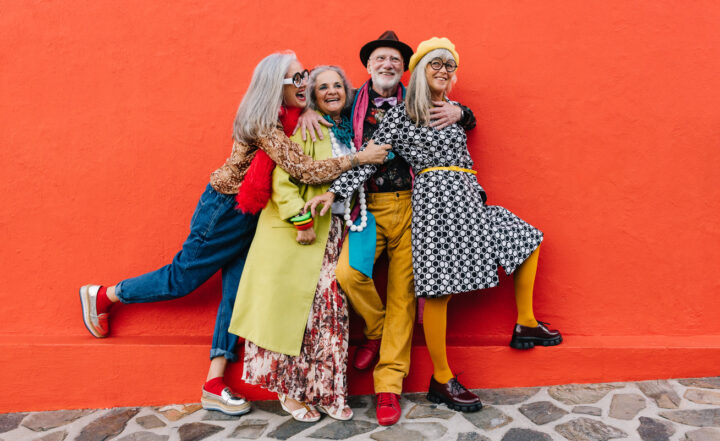There’s a common belief that older people always wish they were younger, but that’s not necessarily true.

While plenty of Boomers admire the energy and activism of younger generations, there’s a sense of relief among many of them that they’re not navigating the chaos of growing up in the 2020s. Here’s what they’re (sometimes smugly) grateful to have dodged. Having grown up in the ’60s and ’70s doesn’t seem so bad by comparison.
1. The pressure to have a personal brand by age 14

Back in the day, you could just be a teenager—awkward, messy, and figuring things out. Now, kids are expected to “build their platform,” curate their vibe, and stand out online before they’ve even finished school. Boomers look at that and think, absolutely not. They got to grow up without worrying about how every photo, interest or mistake might be screenshotted and passed around. Privacy wasn’t a luxury; it was just normal life.
2. Constant comparisons through social media

Boomers never had to scroll through highlight reels of other people’s lives while sat in their pyjamas wondering why they don’t own a villa in Bali. Now, it’s an endless comparison culture—from careers to bodies to travel—and it’s exhausting even to watch from the sidelines. They may have had pressure from magazines or telly, but nothing like the 24/7 flood of polished perfection on every app. They’re glad their self-esteem didn’t have to survive Instagram.
3. The housing crisis

Even the most humble boomer will admit: buying a house back then was a totally different ballgame. Yes, they had interest rates to contend with, but the prices weren’t a cruel joke. A two-bed semi didn’t require three jobs, a side hustle, and rich parents. They know that if they were starting out now, getting on the property ladder would feel like a fantasy. And most of them quietly know they were lucky to get in when they did.
4. Dating apps and the weird world of modern romance
 Source: Unsplash
Source: Unsplash Swipe culture, breadcrumbing, ghosting, algorithmic matchmaking—it’s enough to make anyone dizzy. Boomers might joke about meeting their partner at a bus stop, but there’s real relief behind it. Dating used to be messy but human. Now it’s a minefield. They’re not jealous of the “infinite choice” that often leads to nobody committing. They’re grateful they got to fall in love without also needing to master app strategy or decode blurry mirror selfies.
5. Career paths that feel more like obstacle courses
 Source: Unsplash
Source: Unsplash They didn’t have to juggle unpaid internships, side hustles, algorithm-friendly CVs, and networking events just to land an entry-level job. A lot of boomers got stable careers by sending off a paper CV and showing up on time. They’re watching Gen Z grind through intense competition for basic opportunities and quietly thinking: thank goodness we got in before things changed.
6. The pressure to “stay relevant” forever

Once upon a time, getting older meant slowing down. Now? Everyone’s expected to learn new platforms, stay trendy, and keep up with constant changes or risk becoming “obsolete,” even in your 20s. Boomers? Not their problem. They love that they can just be offline, own their hobbies without needing to explain them, and not worry whether their opinions are going to get them cancelled.
7. Always being contactable

Boomers had entire evenings (and even weekends!) where no one could reach them. No emails, no group chats, no notifications lighting up at 11 p.m.. If you wanted peace, you just left the house and went out. Bliss. Now, being reachable 24/7 is the norm, and switching off is a skill in itself. They’re watching younger people burn out from the constant connection and feeling quietly grateful they got to enjoy life before the pings took over.
8. Student debt that takes decades to pay off

Yes, they paid for university—sometimes even with a weekend job. These days, young people rack up tens of thousands in debt just to get a degree, and then spend half their working life paying it off with interest. Boomers might not have had TikTok tutorials, but they also didn’t have a debt the size of a small mortgage attached to their education. They’re not complaining.
9. Constant digital surveillance

From Ring doorbells to location tracking to facial recognition, privacy has quietly vanished. Boomers grew up in a world where what you did on a night out stayed in that night. There were no viral videos or screenshots waiting to haunt you. They see young people navigating life with eyes always on them, sometimes literally, and breathe a sigh of relief that their wild years weren’t documented frame by frame.
10. Wellness culture gone extreme

Today’s youth are bombarded with health advice, toxic productivity, biohacking, and routines that start at 5 a.m. with a smoothie made from activated oats. Boomers? They just had toast, walked to school, and called it balanced. They’re glad they didn’t have to turn their entire lifestyle into a project or track their water intake like it was a competitive sport. Life was simpler, and that wasn’t a bad thing.
11. Climate anxiety

Young people today are growing up with an existential threat baked into their futures. Boomers didn’t spend their childhood wondering if the planet would be liveable by retirement age. That weight simply wasn’t there. While many Boomers are now deeply concerned about climate issues, they’re honest enough to admit they didn’t grow up under this looming sense of environmental doom—and that’s a privilege.
12. Cancel culture and constant scrutiny
 Source: Unsplash
Source: Unsplash Every opinion, joke, or slip-up can now become a public spectacle. Boomers are aware they said things back in the day that wouldn’t fly now, and they’re actually glad they didn’t have Twitter during their formative years. It’s not about wanting to say offensive things—it’s about the pressure of always being perfectly correct, online and off, without ever getting anything wrong. It’s intense, and they’re glad they missed that boat.
13. The cost of literally everything

Boomers remember when a Freddo cost 10p. Now you need a loan for lunch and £40 to fill up your car. They might moan about prices too, but deep down, they know it’s nothing compared to what younger generations are dealing with. From rent to basic groceries, costs are brutal. Boomers may have faced their own financial hurdles, but they weren’t contending with £5 pints and £900 flat shares with mouldy ceilings.
14. Navigating identity politics in real time

Today’s young people are constantly learning, unlearning, and rethinking how to talk about identity, gender, race, class and more. It’s important, but exhausting. Boomers had rigid roles, which wasn’t always good, but it also meant less daily mental gymnastics. They’re watching the next generations try to do better, while also trying to avoid saying the wrong thing and getting publicly shamed for it. It’s a delicate dance they’re relieved they don’t have to lead.
15. Never having downtime that isn’t “productive”

Relaxing used to mean doing nothing. Now, downtime has to be mindful, goal-oriented, or aesthetically pleasing. Young people feel guilty for resting unless they’ve somehow monetised or documented it. Boomers are glad their hobbies weren’t turned into side hustles or content. They did crosswords or went to the pub, not yoga for their brand. The break was the point—not the performance.




